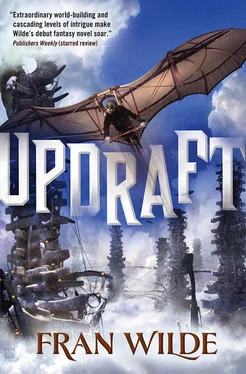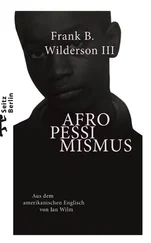We’d only flown for a few minutes that day, tumbling into the tightly woven nets as we learned the winds around Densira. I’d rushed home and, in answer to Ezarit’s “how was it?” my nose and eyes had run like rainspouts.
“Sidra’s father talks too much, up at the top of Densira,” she’d said bitterly. “Your father didn’t return from a trade run. He could have been taken by a skymouth, but no one knows for certain. It wasn’t your doing.” And that was all she ever said.
She’d walked away from me, shoulders hunched, while I buried my face in my sleeping mat. She’d left early the next morning for the Spire, stopping to kiss my head. “Don’t let them tell you who you are, Kirit. Don’t let them see you cry.” I’d pretended to be asleep. But I heard her.
She’d petitioned the Singers that day, though she would not say for what. But her trade routes got better, and, when the tower grew, we were allowed to move to the new tier. Above Vant and his family. A great honor.
Now she was on a trade, and I’d wept again. For whom? For what? Nat still shook me, gently. “I’m all right,” I sniffled. He let go.
“What did the Singer say?” he asked.
My mouth went dry. I shook my head.
“Fine, Kirit.”
“It’s not that, Nat. I can’t say what he said.”
He opened his mouth to press me for more, but a clatter at the balcony signaled Councilman Vant’s arrival, along with the tower guard from this morning. They held a net basket between them.
“I’m not getting in that thing,” Nat said.
“No.” The councilman shook his head. His jowls jiggled. “You’re not. Kirit is.”
My jaw dropped. To be sent downtower was one thing. To be sent by basket like an invalid or a cloudbound offering was entirely another. I began to protest, but the councilman held up a finger. “Singer’s orders.” He smiled with pleasure.
The councilman’s enjoyment of my mistake made my stomach clench. Perhaps he hoped this was the first of many small falls.
My mother was not here to ease the way with kind words or gifts. I must do what he said, without making things worse.
I looked around once more before climbing in the basket. Our wide quarters were so recently grown atop the tower that the inner walls hadn’t yet begun to thicken. The space was comfortable, for all its newness. We had cushions from Amrath tower, and woven storage baskets in elegant patterns from Bissel. Chimes made from reclaimed metal so old they’d worn smooth of their past hung from the ceiling in the center of the room.
I realized too late that I didn’t want to leave this height for downtower’s stink and worry. Councilman Vant’s family had likely felt the same, as the tower grew past them. They’d been accustomed to being at the top. But towers rose according to need. Densira hadn’t risen for years, until Singers arrived with their rough scourweed and chants. Until they’d coaxed the bone tower into growing a new level. But Densira kept groaning. Once, while I’d lived downtower, Nat and I had skipped flight to cruise over the expanse of new-grown bone, and I had spotted the beginnings of a second tier, a natural one, emerging atop the one the Singers had called in the traditional way. After two seasons where the walls creaked and the wind cut ghost patterns around the emerging core, the tier thickened and steadied enough to be occupied.
My find was a tiding, my mother said to anyone who’d listen. She conferred with the Singers and they named our family the occupants, though we waited another season to move. No one had wanted to interfere with the tower’s rise. Then we’d climbed, all of us, past Vant’s tier, while quite a few other families filled in our former quarters below. Nat had been right to tease yesterday that we were only newly risen, our tier as well. It still stung.
Even now, as I prepared to leave, the central wall creaked and settled. It whispered tower dreams to us and to its cousins all across the city. I wished that the city would speak at this moment. Then the Singers would focus on its message, and not on me.
Elna and Nat descended the rope ladder and left me in my home. Two days ago, I would have given anything to leave it. Now I wished I could stay.
The guard cleared his throat. I heaved my things into the basket, and the councilman helped me in.
“Kirit Lawsbreaker, you’re a poor example to your tower. Let your penance make you humble. Let it be of service to Densira,” he said. I waited for him to say more. Instead, he and the councilman swung me over the edge of the balcony, making the basket spin. I twisted in the air, wingless, like an infant, as I sank below the floor where my family lived.
Above, the guard played the rope across the cleats cut into our balcony. As the basket jerked down and down again, people emerged on Mondarath’s and Densira’s gardens to watch. My skin prickled with the attention, but there was nothing I could do. The fiber net held me tight against the wind, which pushed it dizzyingly against the edge of the balcony. The ropes groaned as they bore my weight.
My eyes raked the sky for another mouth or more teeth, found none.
The basket stopped and then started moving again precipitately. Perhaps the guard and councilman had argued about whether to let the rope go, whether to drop me over the edge. They’d be free of the luck, good or bad, that now plagued their peaceful and well-ordered tower. As sometimes happened with invalids.
The net creaked. I laced my fingers around two of the larger knots and held tight.
Below, the tower disappeared with its neighbors into the depths, growing indistinct long before the cloudtop obscured everything. Farther down, the songs said, the tiers grew together, even some of the towers, as the bone cores expanded out, filling the hollows of old quarters. Even farther down, well below the clouds, lay legend. The oldest songs sang of a bone forest, and the people who climbed it and lived because they kept going higher. And so we still climbed.
Except me. I sank lower, at least for now.
After a lifetime of swinging in my cage, edging lower, then swinging again, I reached Elna’s tier. She hooked the net basket with a bone crook, the one she used for bringing in market baskets. Perhaps this very basket. It reeked of onions. Elna and Nat pulled on the crook together and drew the basket onto her small balcony. I climbed out and sat on the ground for a moment, catching my breath.
Elna tugged on the rope twice, and the councilman and his guard yanked up the empty basket.
Far below, the clouds glowed pink with sunset. With Allmoons so near, we were flush with the kind of light that faded quickly. The kind that sank to cinder only a few hours after it kindled. Elna’s quarters were ruddy with the declining sun.
I looked around my prison. The same walls and tapestries of my earliest memories, but smaller as the inner wall thickened. One day, the tier would be filled with bone, and no one would live here. For now, Elna hummed Remembrance — sung at Allmoons and Allsuns — in the kitchen. And Nat. He looked at me now as if I’d made the skymouth with my bare hands on purpose. “You’re bad luck,” he grumbled. But I saw worry behind the anger. He needed to pass his wingtest too.
I wanted to snap back at him, but fighting with him would make things worse. I pressed my lips together.
Elna emerged from the kitchen to shake her head at both of us.
“Serves you both right.” She handed me a piece of lentil flatbread.
“I don’t see why I’m punished,” Nat said. “I’ll miss training. I’m not the numbhead who went out.”
She swatted him. “You didn’t stop her. And you closed the shutters. What do you think?”
He looked down. I saw myself through his eyes for a moment. Not Kirit the sometimes-sister, wing-friend of his childhood; now just the spoiled high-tower person who took his mother’s attention and got him censured.
Читать дальше












